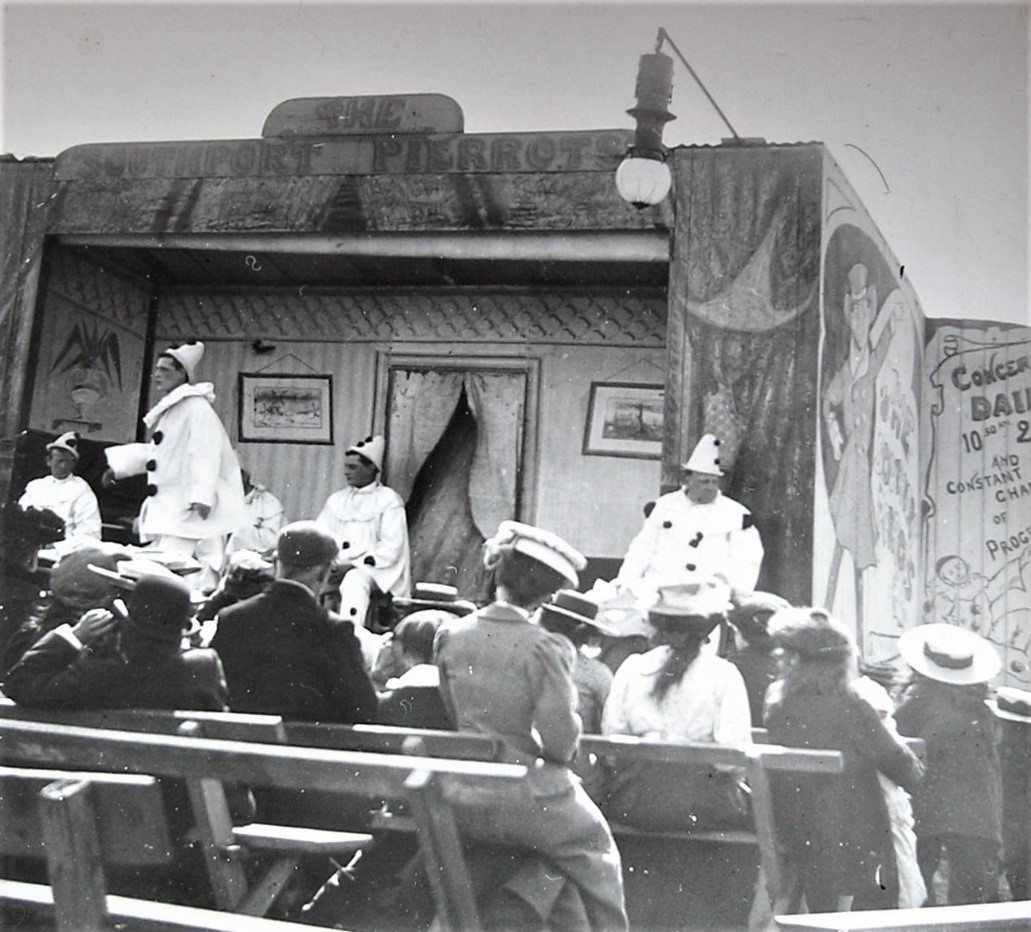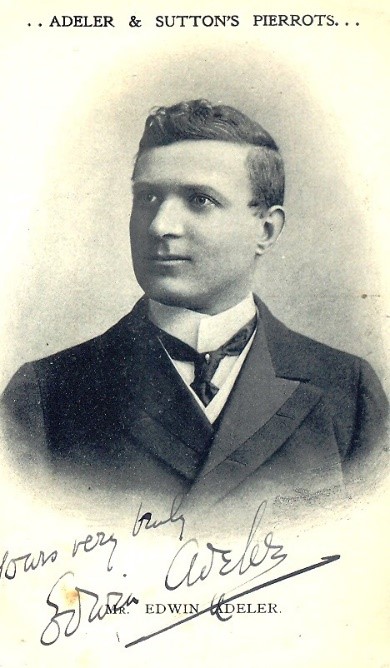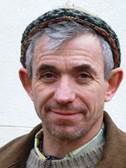News
7 June 2020 / Grants and Awards
The Tortoise and the Hare

Image: ‘Adeler & Sutton’s Pierrots’ performing in Southport – from a lantern slide in the author’s archive
Tony Lidington received a Research Award in 2019 for his work on Early Pierrot Troupes. A showman, researcher and teacher for over 35 years, he specialises in historical popular entertainment forms and their application to contemporary contexts. He writes for us here about the painstaking archaeology of theatrical research into a pioneer of British pierrot troupes & concert parties – Edwin Adeler.
We live in a digital age when information whizzes across the virtual superhighway to countless locations in the blink of an eye. This very website can contain the knowledge of a vast library, but with the added advantages of hyperlinks, tags and image galleries, with unprecedented access across the globe. Yet even with the paraphernalia of technology available to us all in our offices and front rooms, the detail of primary research remains painstaking and slow, but what it can unearth is as rich and dazzling as any jewel that glitters from the mud of a detectorist’s discovery.
It was nearly six years ago that I had my last text message from Chas Ambler: I still have that conversation thread on my mobile telephone and it is now more than five years since he died at too young an age. It is one of those strange anomalies of modern life that our ‘live’ conversations continue to exist in hyperspace long after our ‘death’ on text, or Facebook, or websites…
I had met Chas whilst touring with my pierrot troupe The Pierrotters at various gigs in the North West: he lived in Morecambe and played with jazz bands as well as touring with contemporary avant garde companies like 7:84 and the Natural Theatre Company. In one of our chats, he said that he had at home, in a cupboard, the unpublished memoirs of his grandfather – Edwin Adeler, who had been a pioneer of the pierrot troupes and concert parties in the late nineteenth century. Having heard some of my Radio 4 broadcasts about the history of popular entertainment (in particular those about pierrot troupes and concert parties), he asked if I would like “to do something with them?” I said “Yes” (possibly rather too quickly!) and sometime later, a plastic bag arrived with a range of loose-leaved papers – some hand-typed, some hand-written, all dog-eared and muddled-up.

It was clear from a cursory glance that the information contained therein was a gold-mine of information for anyone fascinated with the emergence of the new artform, the history of busking and the evolution of British popular entertainment at the turn of the century. But to make it accessible, it needed to be digitised and so the painstaking task of archival retrieval began, in order to piece together the story of Edwin’s role in the creation of a mass movement of British popular entertainment, which still has impact today.
This involved several laborious processes: I used my desktop scanner at a high resolution to digitise the original text. I then transferred that scan to a text- reading software package which rendered each page ready for saving as a Word document. However, each page was so inconsistent in print (some almost illegible through having faded over time and some so creased and dog-eared), that almost every word on each Word page had to be re-edited. Once a page was in a recognisable and understandable format, I then regularised the spacing and font. Once I had done this for all of the 60+ pages, I simply had to organise them into what seemed to be the right order (although there were obviously several chapters missing and some random pages too) and put all the separate documents together into a single text. This then meant that I had the whole story together and it could be read easily. I could then follow-up various leads within the text and find corroborative information from other sources and work-out a timeline for Edwin’s activities, as well as images which graphically illustrated some of his textual descriptions.
So now, 5 years after Chas’ death, I can say that I have finally managed to make his grandfather’s work and life accessible again. For nearly three months, I worked each night once the kids had gone to bed, to be able to complete the task, so that I could honour my commitment to Chas “to do something with them” and in the process unearth the archaeology of ephemeral performance forms. It has been a slow, tortoise-like progress, but now it is done, Edwin’s text, experience and wisdom can whizz across the ether, like a digital hare – in a way which would be utterly unimaginable for those, like him, who for centuries plied their trade as live performers, to real people, in real places, in real time.
Here are the first paragraphs from Edwin’s manuscript, published for the first time since it was written:
“There are many people who insist that I am the Father of the institution called ‘Concert Party’. The compliment may be considered a two-edged one, but it is, at any rate, undeserved. I started that part of my career as a ‘busker’- on the promenade at Weymouth on Whit Monday l894, but there were others in the same kind of business for some years prior to that date. Let me here define the difference between a busker and a beggar. Of the thousands of street performers one sees in London today, the great majority are beggars, because their efforts to entertain are a farce, and they appeal to the pity of the passer-by.
But if a performer, whether he be in the streets, before the queues, or on the seashore has some talent, and gives entertainment value, and takes himself seriously as an artist, however humble, then he is a busker, and maybe an honest, honourable, self-respectable man. He is as much entitled to the pennies put in his hat, as is C.B. Cochran to his fifteen shilling stalls. Nay, more, he is a living lesson in economies, a true Socialist, in that he has abolished the middlemen, and has cut away from the artificial conditions of society. He has brought his goods directly to his public, who have the unique advantage of being able to pay for them or not – as they may wish.
I call myself a busker, although I have been engaged in many other ways at various times in a chequered career, because it was as a busker that I first came into prominence in the world of entertainment. Before that time however my life was by no means devoid of adventure, so, perhaps, it will be better if I introduce myself properly, and go back to the beginning of things, so far as I am concerned.”
Dedicated to Chas Ambler and Edwin Adeler, and with thanks to the Society for Theatre Research, whose generous award in 2019 made this research possible.
 Tony Lidington was awarded a doctorate for his research into itinerant British performance forms by the University of Exeter, where he now teaches. He regularly writes about the subject for academic journals and general interest magazines, as well as broadcasting on both radio and television. Tony was founder of The Pierrotters – Britain’s last professional seaside pierrot troupe, with whom he performed for 27 years as ‘Uncle Tacko!’
Tony Lidington was awarded a doctorate for his research into itinerant British performance forms by the University of Exeter, where he now teaches. He regularly writes about the subject for academic journals and general interest magazines, as well as broadcasting on both radio and television. Tony was founder of The Pierrotters – Britain’s last professional seaside pierrot troupe, with whom he performed for 27 years as ‘Uncle Tacko!’
www.prom-prom.com www.seasidefollies.co.uk